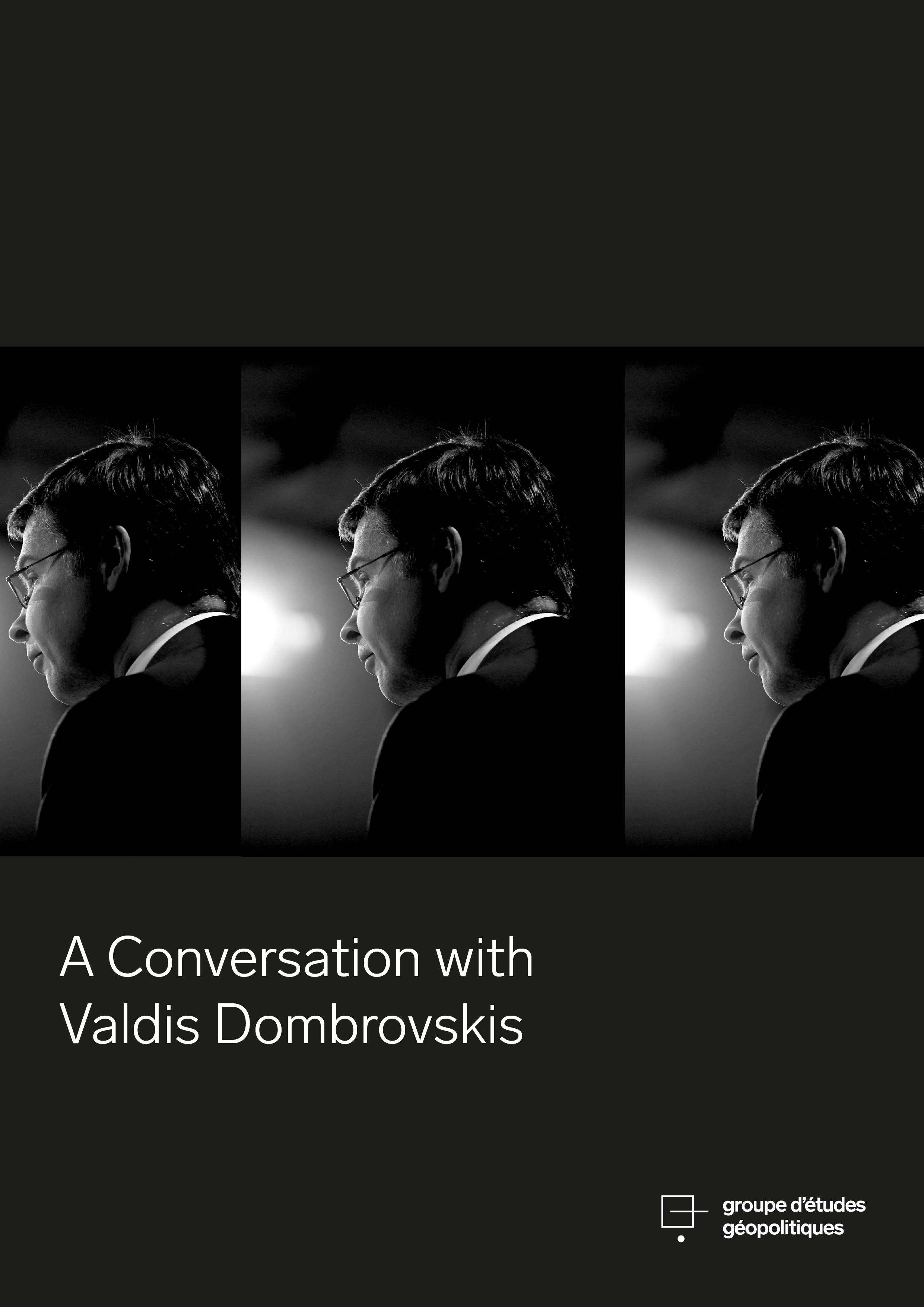A Conversation With Valdis Dombrovskis
Maria Tadeo
Grand Continent EU Correspondant20/02/2025

20/02/2025

 Voir tous les articles
Voir tous les articles
A Conversation With Valdis Dombrovskis
Ukraine’s future as a sovereign country is at stake and the European Union is not at the negotiating table. Where does it go from here?
This is not an acceptable scenario for the European Union and precisely because we don’t believe in it, we must work together to avoid it. That means two things: we must maintain our open engagement with the United States, and we must substantially increase our own efforts in terms of defence spending, capabilities and support for Ukraine. The war that is taking place on our continent, and the way the peace talks around Ukraine develop will have a direct impact on Europe.
As Europeans, we want a fair and lasting peace that also reflects the international principles we defend of sovereignty and territorial integrity. Any fair and lasting peace must include Ukraine and Europe.
The United States seems to prefer direct talks with Vladimir Putin and has even suggested that he could bring Russia back into the G7. Vice President J.D. Vance said in Munich that it’s not Russia but the EU and its “Commissars” that poses the greatest threat to Europe. How can the EU meaningfully engage with the US in this context?
This is first and foremost a European issue. It is entirely in our hands to step up our engagement. We are ready and willing to do so. That means more support for Ukraine and more hard power. The stronger we become, the stronger our voice will be in these talks.
I was surprised that Vice President Vance did not mention Ukraine in a speech at a security conference. There were certain expectations that he would use this platform to elaborate on the views of the US administration, given that President Trump is already talking to Putin. In this sense, he left many questions unanswered. That is why I think we need to continue to engage with the United States to understand what they are really thinking.
We need to bring them closer to a common trajectory and a common understanding. That won’t happen unless there’s an intense engagement between us.
President Trump is expected to ask for 5% defense spending instead of the current 2% and to ask Europeans to buy more American weapons. At the same time, he is threatening tariffs.
Does the US see Europe as an ally or an ATM machine?
We should not mix these questions, even if it has become very difficult to disentangle them. We have to look at each issue separately, one by one.
First, there is the question of Ukraine where I believe we have to reach a common understanding with the US administration. Then there’s NATO – where the Commission doesn’t have any competences over – and security guarantees for Ukraine.
On tariffs, we have been very clear that we do not see any economic or legal justification for targeting the European Union. Economically, we have the largest trading and investment relationship in the world. Our supply chains are deeply intertwined and there is a lot at stake for both economies. Tariffs would be very disruptive to the supply chain and the economic impact of escalation will be damaging for both. The United States will suffer greatly — not just the European Union. At this stage, our focus is on working with the US to see to what extent we can avoid such an escalation.
Is the Commission ready for more tariffs to be announced?
The White House has announced tariffs on steel and aluminium, alongside what they call “reciprocal tariffs”.
In both cases it remains to be seen what will happen in practice. Having said that, we have been clear that we will defend our economic interests and we will respond in a firm and proportionate way because we do not believe that these tariffs are justified. This is exactly how we dealt with tariffs during the first Trump administration. They imposed tariffs on steel and aluminium and we responded with counter-tariffs.
Our goal remains to avoid trade escalation, but if necessary, we know how to respond.
For many Europeans, this doesn’t look like a negotiation between partners in good faith.
Should Europe capitulate in order to survive, or should we also act forcefully?
Our approach is one of open, strategic engagement that doesn’t jump to conclusions while discussions are ongoing.
The European Union and the United States are strategic allies, and it is particularly important that we work together in the current geopolitical context, with autocracies rising around the world.
We defend the rules-based order but if we face concrete difficulties in specific areas, we will respond.
On defence, whether it’s 5% or not, we will have to increase our spending, not because of President Trump, but because of Russia. Putin has invaded a neighbouring country and is openly talking about invading other NATO countries. This is something that European public opinion should be concerned about.
If Russia feels it has succeeded in Ukraine, it will march on. Not against the United States, but against other European countries. That is why, for our own good, we need to increase our capabilities.
US Secretary of State Marco Rubio has suggested that in any conflict, concessions must be made in order to reach a solution. This could have implications for the West and its sanctions policy towards Russia. Do you see the possibility of sanctions being lifted?
No, in fact we are doing the opposite. We recently announced our 16th package of sanctions against Russia. We are introducing new import and export restrictions, tougher measures to curb evasion, and we are cracking down on Russia’s shadow fleet. We are keeping the pressure on the Kremlin, not easing it.
Commission President Ursula von der Leyen has said that these are extraordinary times, and that means extraordinary flexibility is justified in a number of areas, including debt and deficit rules. But fiscal space remains tight, some member states have found it extremely difficult to adopt a budget and there is still no consensus on new joint debt to finance defence spending. What does extraordinary measures mean to you?
President von der Leyen has announced that the escape clause under the current fiscal framework could be triggered and we are working on that as a possible solution.
We will come back with further proposals on this in the near future.
Does this mean that defence spending will be excluded from the calculation?
I will not go into the details of the design, but what I can say is that this issue is firmly on the Commission’s agenda. We have discussed it with Member States and it came up as a clear request from European leaders at the recent informal European Council. As the European Commission, we are responding to that request, we are working on it and we will come up with solutions shortly.
What does shortly mean? In a matter of days, weeks?
Shortly means in the next weeks. My point is we will find a solution.
Some member states have indicated that they would support a Covid-like response to this crisis, arguing that it is equally existential for the Union. That means joint borrowing. The Spanish government has also argued that the EU budget needs to be doubled to match the scale of the challenges ahead. What should a European big bang response look like?
There are two different issues.
One is more flexibility, which we are working on, and then there’s the question of an instrument similar to NextGenerationEU. Next month, we will be presenting a White Paper on the future of European defence, and that will be an opportune moment to discuss many of these issues.
President von der Leyen has called for major simplification, which some argue is a code word for deregulation in the European Union. What does European style simplification mean?
We have set out our plan and our targets. We want to reduce administrative burdens by 25% in general and by 35% for SMEs. We are already preparing the first legislative proposals. If you look at the Commission’s work programme for this year, you will see that there are already a number of simplification proposals in the pipeline: three omnibus proposals and several other packages, including digital, common agricultural policy and chemicals. We are moving fast.
We are also clear that we are talking about simplification, not deregulation. We will not abandon the Green Deal. We are not abandoning our social and environmental standards. Simplification is part of our competitiveness agenda. Business has raised concerns about red tape. We have listened. But we are equally clear that this is not about deregulation. We will simplify while maintaining our standards.
Are you undoing in this second mandate what you built up in von der Leyen’s first term? The criticism is that this Commission has a Dr Jekyll and Mr Hyde approach to its own work, reinforced by the general context, which is very different from 2019, when the Green Deal was announced and there was no war in Europe.
Not necessarily.
We are not moving away from our policy objectives.
We are looking at how to achieve them in a more practical and cost-effective way. We are coming out of a period of intense legislative activity, so it is time to take stock. To see what works well and what can be improved, to see where there are gaps and where there may be overlaps, and to adjust where necessary. We did a similar exercise after the financial crisis. After new legislation was introduced to ensure the stability of the financial sector, we ran a call for evidence to see what was working and what could be streamlined. This is not the first time we have done this, although this time it is more far-reaching and we are looking at the whole body of legislation with a view to simplifying it across the board.
Mario Draghi called for radical change or face existential decline. For Europeans, is there still hope or are we becoming irrelevant on the global stage?
We are a major economic power, we are a trading superpower.
There are structural challenges — from productivity to demographics, high energy prices to the administrative burden — but that means we have to work and get on with it. Draghi is right, it cannot be business as usual. We need to focus on our competitiveness, we need to focus on creating a better business environment and we need to focus on becoming stronger when it comes to defense.
That’s exactly what we are doing.
We should not talk ourselves down or allow others to do so.
citer l'article
Maria Tadeo, A Conversation With Valdis Dombrovskis, Feb 2025,





